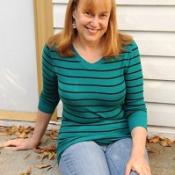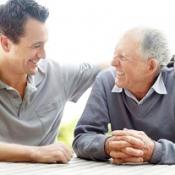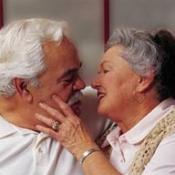 I woke up to my dad staring blankly at the wall the morning of October 14, 2004. It was the day before my 23rd birthday. I knew this day was coming, but nothing would prepare me to wake up and find my dad no longer alive—just a lifeless shell. He had battled Hodgkin’s lymphoma for a year and a half. At 54, his time here was over.
I woke up to my dad staring blankly at the wall the morning of October 14, 2004. It was the day before my 23rd birthday. I knew this day was coming, but nothing would prepare me to wake up and find my dad no longer alive—just a lifeless shell. He had battled Hodgkin’s lymphoma for a year and a half. At 54, his time here was over.
After my mom and I had cried over his body and walked the body bag down the hall, we decided to go out for lunch. Such an odd next step after your father was here on earth and now is suddenly just … not. We ate steak and potatoes and drank Diet Coke in his honor. It’s these things, I’m pretty sure, that led him down the cancer path, but that’s another story.
When I got home from lunch, I was all alone in the apartment we had lived in together. Strange things started happening. The lights went on and off. The song “Time Is Ticking Out” by The Cranberries was stuck on repeat on my stereo, the caps and num locks on my keyboard blinked back and forth without me touching anything at all, and my quiet cat, Bastian, was staring up at the corner, meowing at the wall. I was sure this was my dad trying to communicate that he had crossed over.
When I looked at him earlier that day and had called out, “Dad?” as if he was going to respond to me … I knew he wasn’t there, but what an odd thing? How can you be there and then … just not be there anymore? This moment made me come to be obsessed with learning about near-death experiences and worlds beyond the physical.
As I attempted to maneuver life, I felt like everyone started to disappear. The relationships my dad had built slowly started to fade. People were as scared to see or talk to me as I was of them, fearful of dealing with the harsh realities that my father was no longer with us. This took such a toll on my heart, as I wanted so badly to connect but had no idea how. How could life have brought me to this place of being 23 and not able to enjoy my dad in my life? Why do other people get this opportunity, yet it was “stolen” from me?
The Real Truth About Death
I continued to explore spirituality, reading many books about near-death experiences. P.M.H. Atwater changed my life with her book, The Real Truth About Death. In this book, Atwater tells the story of physically dying three times, each time going deeper into the afterlife. After returning from the dead, she interviewed more than 3,000 people from around the world who also had near-death experiences. After reading this book, I fully believed there was life after death. How could there not be? So many people from all over the world telling similar stories of tunnels, light, loved ones who had passed greeting them, and many times someone telling them their time is not over and it’s time to go back … doctors who can verify that their heart stopped beating for long periods and they were thought to be totally dead … there are too many similarities from all walks of life, all religions and ages, not to believe.
One evening in September 2008, I had one of the most dramatic spiritual experiences of my existence. I remember this event very clearly because I was conscious for all of it. My father came to me as what I can only describe as a spiritual entity—a ball of energy and white light. I knew it was him because I could feel him. The last time I had felt him in that way, he was alive and here on earth. He told me, “You need to spend more time with your mom because you don’ t know how much longer she’s going to be here.” I took this information very seriously and decided to take the opportunity to have a big 27th birthday party and invite my mom.
The Red Party
In October 2008, I had a red-themed party. Everyone came dressed in their brightest red. It was so good to see my mom, as we were just beginning to become friends again after a long period of post-teenage-into-early-twenties angst and her not fully accepting me dating women (I’d like to note that on my dad’s deathbed, he asked my mom to please accept me for who I am. Without the acceptance, we probably would not have a relationship in life.) This would be the last birthday she would spend with me.
A few days later, I learned that my uncle had taken my mom to the hospital. She was feeling weak and wanted to get checked out. I had planned to meet some new web clients at a cafe on this particular day. I’ll never forget waiting for my clients to arrive and, in the meantime, getting the phone call from my mom. She never expressed too much sadness in my life, but on the other end of the line, she was crying. “Lisa, I have leukemia,” she said. My heart dropped into my stomach. I realized this could be the very moment my father tried to warn me about.
We started the cancer roller-coaster ride of deciding what chemo to get and hospital visits. A few months in, the doctors had told us she was officially in remission. Come to think of it, this may have been a lie my mom had told everyone so we wouldn’t worry. In April 2009, her doctors had a sit-down with us and had the dreaded “there’s nothing else we can do for you” conversation. “All of your inner organs have a tumor wrapped around them.” ARE YOU SERIOUS? Part of me thought it was all a joke, and the other part of me was like, OK … OK universe … I know what’s going to happen. You have prepared me for this once before, and I’m going to have to do this again.
“I’m Sorry You Won’t Have Parents”
Later that day, I sat at my mother’s feet as she placed herself in the Pepto Bismol-colored recliner I had slept in many a night. She said, “I’m sorry you’re not going to have any parents anymore.” (This sentence has echoed in my brain thousands of times since this moment.) We used our time wisely, attempting to get things in order (or at least as in order as my mother would let them be). We watched our favorite movies, like “The Golden Child,” and laughed and cried in each other’s arms. I told her how much I was going to miss her … how much she meant to me, how thankful I was for her having me and everything she did for me in her life. She confided in me about things she would have never told a soul if she had the opportunity to continue on. We giggled at night about farts and stinky feet. I stopped my life to spend as much time with her as I could. I knew this time was precious and measured by the universe. I wasn’t going to let one drop of it go.
I was with her during her last weeks on earth. As the day got closer, she began to see people. My dad and her mother had come to tell her it was soon time. She had also seen people in Bermuda shirts with red balloons getting ready to welcome her. She saw an angel and I asked her to describe her to me. Long, blonde hair, white light around her, beautiful white dress … I could tell my mom was readying herself to transition, and these greetings were comforting to her. I played Enya in the background. Got her a professional, cancer-trained masseuse. Asked friends to join us and play music. The dreaded coma before death finally began to set in, and I wasn’t sure what moment she was going to go; it seemed like every breath could be her last.
Before I left to get some sleep, my mom had woken up with that last energy thrust many speak about (my dad had done the same). She was thirsty and hadn’t had water in what felt like days. I had been wearing a special shirt just for my mom because she liked it. The last thing she ever said to me—and I have no idea how she could have even formed words, because she had been on the edge of death for so long—was, “That’s a pretty shirt.” Hours before she passed, I began to get blank emails sent from no one, with nowhere to reply to and no subject line. Friends came to spend last moments with her. Her body got cold, her temperature was no longer reading on a thermometer … and after midnight on June 23, 2009, I watched my mom take one last, long breath. I had been watching the heartbeat through her neck for hours; after the long sigh that came from her lips, there was no movement at all. She seemed to settle into a peaceful smile. Her brow had calmed … her last day on earth had finally come … and I realized all at once that I was actually, totally, and utterly alone.
I sat with her for a little while, until a crew of people came barreling in to “place” her body so that when rigor mortis set in, she wasn’t in a weird position. They told my uncle and me that we had about an hour and then had to leave, so we gathered up her things and walked out to the parking lot—which may have been even more weird than when I went out to lunch and then went home after my dad died. I told my uncle I loved him, went into my tired, blue jalopy, and cried harder than I had ever cried in my life. I wailed as the idea of being alone in the world sunk in … that I knew this day would come … but I was only 27 and would now have to live out the rest of my days attempting to make sense of being so young and without parents.
The days that followed were the most difficult in my life. Freshly moved by two beloved friends (I will never forget what you did for me) the day after my mom’s funeral, one by one everyone I knew went back to their regularly scheduled lives and I was left in an empty apartment, with no parents and way too much alone time.
A Turning Point
During my mom’s illness, I had started to paint whenever I came home from visiting her or when I felt sadness. Although I had gone to art school, I had never really done much work with the canvas. It gave me peace to move paint around with a brush … my fingers … a random object. It was something I felt was beautiful, that I could control, and that helped me express feelings that continued to bottle up. This was the creative outlet I needed.
For several years, friends had asked me to submit to a local community art show. I felt finally this was the year I was going to submit. I found this painting I had worked on during my mom’s illness and decided to submit it to the show, completely releasing whether it would get bought and just focusing on the satisfaction of the simple act of submitting to a public show I’d always wanted to participate in.
I submitted it very last minute and the piece was placed in what I thought was a semi-punishing, badly lit area of the show. We spent hours at the show and, prior to our departure, my girlfriend and I stopped by for one more look—and there it was: a red dot! The piece had been sold!
Submitting this piece was a complete turning point for me. I learned that I had created a healing method that was between me and me. I could work through feelings by placing energy on the canvas, and suddenly I felt like negative energies such as fear and anxiety were being channeled and released on these canvases. The healing process had truly begun.
In April 2011, I decided I wanted to explore blogging. As a web designer, putting one together was easy, but what kind of writer was I? There was only one way to find out! I told myself that I would write when I felt pain and try to turn it into something positive, creating what has become a recipe book for myself and future life situations. My intention was to connect those who were suffering from parental loss, like I was, and to hopefully help myself and others heal through art, writing, and focusing on the positive. Thus, LosingYourParents.org was born.
My intention is to enjoy the time I have in this life, and if I’m not enjoying it, to figure out what I need to do to get unstuck. I got a tattoo that says “follow your bliss” to always remind me of this thing that can seem so easy to forget.
Using my blog and art has helped me tremendously through the healing process. Those of us who have lost our parents are forever changed and will never forget. I do have faith that if you’re dedicated to wanting to live a brighter, lighter life, doing the work, finding the tools, and feeling the feelings will help you move forward. It has helped me. You’ve got to feel to heal.

The preceding article was solely written by the author named above. Any views and opinions expressed are not necessarily shared by GoodTherapy.org. Questions or concerns about the preceding article can be directed to the author or posted as a comment below.

 Taking Things for Gratitude
Taking Things for Gratitude The Caretaker's Conundrum: Guilt If You Do, Guilt If You Don't
The Caretaker's Conundrum: Guilt If You Do, Guilt If You Don't Helping Loved Ones Near the End of Life
Helping Loved Ones Near the End of Life

Please fill out all required fields to submit your message.
Invalid Email Address.
Please confirm that you are human.
Leave a Comment
By commenting you acknowledge acceptance of GoodTherapy.org's Terms and Conditions of Use.